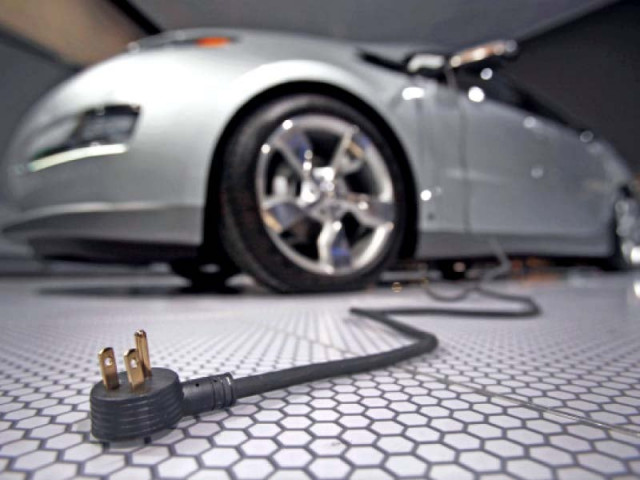Electric vehicles 140% pricier than conventional cars
Automakers blame govt for surge in car prices, urge promotion of hybrid cars

Car assemblers have said that electric vehicles will remain out of the reach of people as these are 140% more expensive than conventional cars despite a recent reduction in taxes, urging the government to instead promote hybrid cars.
In a briefing to the National Assembly Standing Committee on Finance on Monday, two big players also blamed the government’s taxation and exchange rate policies for an unprecedented price hike in Pakistan.
They said that nearly two-thirds of the price of a car was influenced by high taxes and exchange rate value.
Headed by Pakistan Tehreek-e-Insaf (PTI) MNA Faizullah Kamoka, the standing committee took notice of the surge in prices of vehicles more than the currency devaluation.
But the facts produced by Indus Motor Company (IMC), the makers of Toyota brand, and Honda Atlas Cars suggested that it was the government that should be blamed more for the 50-70% increase in prices in the past two years than the big three industry players.
The government should review its tax structure and also promote hybrid vehicles as electric vehicles did not make any sense for Pakistan, said Baber Khan, IMC Head of Corporate Affairs.
“Hybrid car is 15% expensive than the conventional car and the fuel cell (electric) vehicle is 140% more expensive than the conventional car,” said Khan.
Recently, the government approved the removal of additional customs duty and additional sales tax on the import of electric cars.
Under the new policy, only 1% tax will be levied on the import of EV parts for manufacturers while the government also waived registration and annual renewal fee on EVs for the ICT sector.
The committee held detailed discussions on the recent price hike, low quality of vehicles and the impact of exchange rate on car prices.
“Taxes account for 35-42% of the total car price,” said Asim Ayaz, General Manager of Engineering Development Board - an attached department of the Ministry of Industries that is responsible for the automobile policy.
He said that at present the government was charging up to 45% customs duty, 7% additional customs duty, 17% sales tax, 3% additional sales tax, up to 7.5% federal excise duty and 5.5% withholding tax on all types of cars.
Additionally, it charges 50% regulatory duty on vehicles of above 1,800cc engine capacity, according to the Ministry of Industries’ official.
At the current market size of around 200,000 cars being sold annually, the localisation of vehicles was not possible, said the ministry official.
The recent price hike was because of increase in freight cost and imposition of additional customs and federal excise duty, according to Ayaz. He said that manufacturing of vehicles by six more companies may ensure competition in the market.
In the past six months, Honda earned a profit of Rs146 million but it paid Rs6.4 billion in taxes to the government, including sales tax, said Maqsoodur Rehman Rehmani, Vice President of Honda Company.
The deletion plan was largely misunderstood in Pakistan as no contracts had been signed with the companies for compulsory localisation of a complete vehicle, said Ayaz. He said that under the Trade Related Investment Measures (TRIM) agreement of the World Trade Organisation, different countries abolished the compulsory localisation policies.
“Now, imported components that are also locally produced are subject to higher tariffs but cannot be banned for imports,” said Ayaz.
About one-third price of a vehicle is determined by government taxes and another one-third by rupee-dollar parity, said Baber Khan. The cost of locally produced components is also around 34%.
“Anything you touch in a car is locally produced and the IMC’s dealership network is selling Rs200 million worth of parts every day,” said Khan.
Responding to a question, the IMC official said that the local manufacturing of engines was not possible until a company sold more than 500,000 units.
He said that in the past one year, the government imposed 7% additional customs duty and 2.5% to 7.5% federal excise duty, which pushed prices up.
The Federal Board of Revenue (FBR) officers present in the meeting did not contest the claims made by the IMC and Honda officials.
“The government should review its policies and the existing car manufacturers should be given reasonable competition,” said Pakistan Muslim League-Nawaz MNA Ali Pervez.
Published in The Express Tribune, January 19th, 2021.
Like Business on Facebook, follow @TribuneBiz on Twitter to stay informed and join in the conversation.


















COMMENTS
Comments are moderated and generally will be posted if they are on-topic and not abusive.
For more information, please see our Comments FAQ